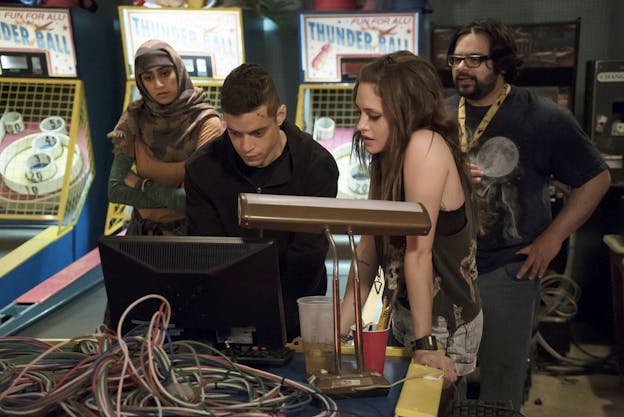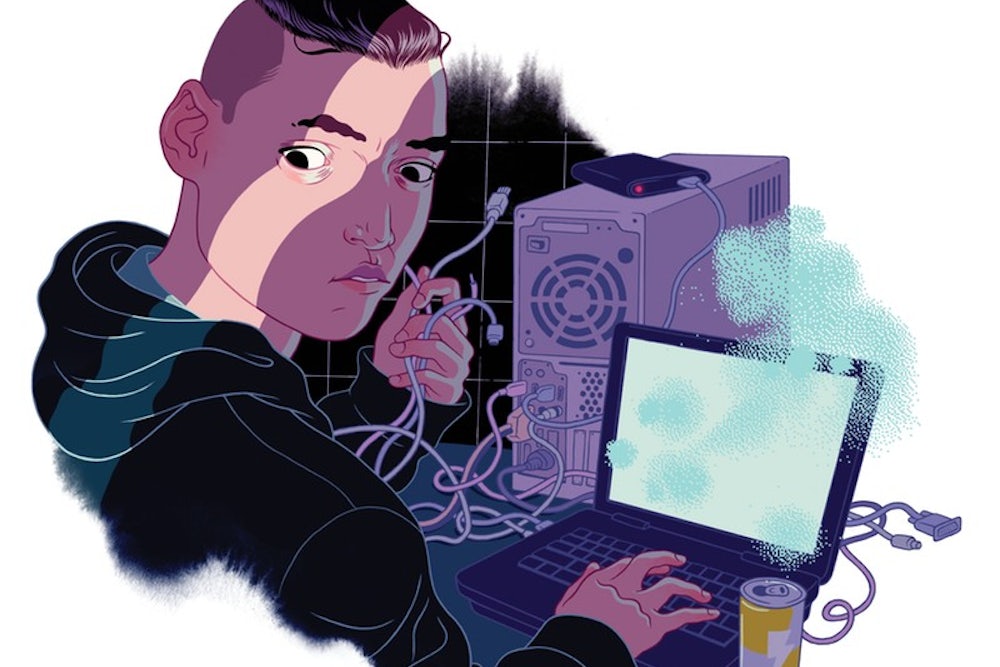If there’s one thing hackers hate, it’s reductive Hollywood portrayals of their profession. The characters in Mr. Robot, an anxiety-inducing techno-thriller airing on USA Network this summer, are no different. In the show’s fourth episode, two middle-aged cybercriminals watch the 1995 film Hackers on a motel-room television. As numbers dance across the screen and Lorraine Bracco frets about virtual rabbits, one of them scoffs at the “Hollywood hacker bullshit,” the unrealistic technology, and rapid typing. “I bet you right now some writer’s working hard on a TV show that’ll mess up this generation’s idea of hacker culture,” he says.
As its first season comes to a close Wednesday night, it seems unlikely that Mr. Robot will be that show. Sam Esmail, the creator, is as obsessed with technical accuracy as Matthew Weiner was with period detail. It’s been eagerly praised by both cybersecurity professionals and hackers for abandoning techno-babble. “Mr. Robot is the most accurate portrayal of security and hacking culture ever to grace the screen,” one member of Anonymous told a reporter. Among the flood of television shows made in the last few years to capitalize on our collective anxiety about privacy and data breaches, Mr. Robot is the first to receive the widespread approval of its subject.
In the show’s opening scenes, we meet protagonist Elliot, played by Rami Malek, in a coffee-shop booth, sitting across from a mass distributor of child pornography. Calmly and without affect, Elliot explains how he hacked into the guy’s network, found kiddie porn, and sent an anonymous tip to the cops. He’s not in it for blackmail, for money, or for any kind of glory. This is the hacker as white knight, an anonymous do-gooder who can spot hidden evil and do something about it. “In three short minutes I destroyed a man’s business, life, existence,” Elliot’s voice-over tells us. “I deleted him.”
Watching this unfold, the viewer is set up for a certain kind of show—the socially awkward hero using his uncommon skills to fight crime, slowly eliminating his city of pervs, creeps, and bad guys. Maybe he will get a lovable partner: Sherlock, with a cyber twist? That kind of show would seem only slightly out of place on USA, a network best known for its procedural dramas with attractive stars fixing problems in sunny locales (see: Burn Notice, White Collar, Covert Affairs). But Esmail, an Egyptian-American director who first conceived of Mr. Robot as a film, is interested in something else. After realizing his script was far too long for the movies, Esmail stretched his narrative into a TV series that, even in this post–True Detective era, is startlingly strange and ambitious—it’s as twisty as the early days of Lost and as visually inventive as Breaking Bad.
Elliot is both more discomfiting and more sympathetic than the many anti-social, endearingly geeky figures of recent TV. Malek, a hypnotic actor, recognizable from minor roles in The Master and Short Term 12, plays him with a boyish intensity: He’s opaque, withdrawn, vulnerable. Yet, he’s uncommonly good at reading people, which is his greatest skill as a hacker. Elliot doesn’t only hack bad guys. In his spare time he hacks everyone he knows: his childhood friend, his psychiatrist, and their boyfriends. He invades their privacy as zealously as he protects his own. For him it’s a compulsion, a way to escape from the lonely void and to connect without having to communicate. Elliot undertakes these small incursions into others’ private information because they give him the feeling of a modicum of control. He may not be able to destroy the free market and save the world, but at least he can protect the women around him, be their invisible hero.
By day, Elliot works at a cybersecurity firm subcontracted to a massive corporation named E Corp—or, as Elliot chooses to hear it, Evil Corp. The show isn’t subtle in its anti-corporate politics, especially in the early episodes. When Elliot’s psychiatrist, Krista (ER’s Gloria Reuben), asks him why he is disappointed in society, his response—“Fuck society”—is shocking only because it’s accompanied by the real logos of Apple, Facebook, Twitter:
Is it that we collectively thought Steve Jobs was a great man even when we knew he made billions off the backs of children? Or maybe it’s that it feels like all our heroes are counterfeit, the world itself is just one big hoax. Spamming each other with our running commentary bullshit, masquerading as insight. Our social media faking as intimacy. Or is it that we voted for this? Not with our rigged elections but with our things, our property, our money.
Then a mysterious character known only as Mr. Robot (Christian Slater) recruits him into fsociety, an underground hacking cell with Occupy Wall Street affectations that wants to erase the world’s debt; their plan is to destroy the data center of E Corp, which controls 70 percent of the consumer-credit industry (an unrealistic detail, but no matter). They meet in an abandoned Coney Island arcade to plot the destruction of capitalism, starting with mega-conglomerate E Corp. (In a nice touch, fictional E Corp shares a logo with real-life Enron.) They release videos in which they wear distorted Monopoly Man masks and threaten to leak documents.

The members of fsociety are angry at America’s oligarchy, and, somehow, idealistic about the possibility of changing it. They claim they want economic revolution, but Trenton, a quiet college student in long sleeves and a hijab, sizes up the different members of the group: one is there for “momentary anarchy,” others are interested in the camaraderie, some just a flash of notoriety. Trenton’s motivations are different: A first-generation Iranian-American, she has no illusions about capitalism after watching her immigrant parents struggle to make a life in the United States. “They won’t shut up about how great America is,” she tells Darlene (Carly Chaikin), an unstable fsociety coder with a strange relationship to Elliot. “But they’re going to die in debt doing things they never wanted to do.”
At least I think that’s what Mr. Robot is about. It’s impossible to be sure—the series shows us the world as Elliot sees it, disorienting and alienating. This is partly produced by the filmmaking—wide shots with characters haunting the corners of the frame; Elliot walking alone through washed-out city streets. From the beginning, we are shown glitches in the narrative and pronounced indications that Slater’s character doesn’t exist. Elliot is our only reliable source for what’s happening, and he’s not reliable at all. His diagnosis is left ambiguous: We know he’s depressed, paranoid, addicted to morphine. We see his dreams and drug-induced hallucinations. Throughout the show, he speaks to us, the audience, as an imaginary friend. “I wish I could be an observer like you. ... Do you know more than me?” his voice-over asks. “That wouldn’t be fair.” When Elliot is given shattering news at one point, he seemingly grabs the invisible camera and throws it on the ground.
In most fictional portrayals of hackers, technical mastery provides a fantasy of control—computer skills are all one needs to manipulate the world. The teenagers of Hackers were like superheroes, brandishing their powers to seemingly bend the laws of time and space. For most movie hackers, hammering at a keyboard yields instant results, which are shown on screen as whooshing tunnels of code. And in recent shows like the much-maligned CSI: Cyber, the criminals are dangerous beyond imagination, all our apocalyptic fears about the dark web come to life.

The notorious leaks and security breaches of the last few years have only heightened that anxiety. But they have also provided us with a counter narrative of martyrdom: the prosecution of Aaron Swartz, followed by his suicide; Chelsea Manning in solitary confinement; Edward Snowden, exiled to Russia. And those narratives have made their way onto the screen, with, for instance, the 2013 film The Fifth Estate, a thriller that dramatizes the story of WikiLeaks, starring a gray-haired Benedict Cumberbatch as Julian Assange. Last year, Laura Poitras’s documentary Citizenfour gave us a true depiction of a leaker, incorporating intimate footage of Snowden in Hong Kong. Like Mr. Robot, these works highlight the idealism of hacktivism and its risks.
Elliot and the other members of fsociety have a certain kind of power: They can hack hospital records and break people out of prison. But in Mr. Robot, the increased pervasiveness of the digital realm only upends reality, suffusing everything with unease. What do we know? What’s real? Are we only the information we let float around on the internet—the social media profiles, passwords, browsing history? The smart characters in Mr. Robot erase all their data from public records, encrypting their identities. The only protection is to delete yourself.
Mr. Robot is one of the few TV shows to successfully portray subjective experience, the world as experienced by one damaged mind. Since Elliot has trained his mind to substitute E Corp’s name with Evil Corp, the show does the same thing. Mr. Robot’s convoluted plot twists aren’t there to jerk us around, True Detective–style, or ramp up anticipation. Instead, the contradictory information leaves us as paranoid as Elliot, distrustful of everything we see.
